PLEASE NOTE:
While the following article relates to your Google search, the services and methods at Goodwin Hypnosis may differ from those mentioned below. Since 2007, we have helped thousands of clients to overcome emotional and behavioral challenges when all else had failed. According to many of them (and their referring healthcare providers), our methods are faster than talk therapy, easier than willpower, and safer than medication. If you’re ready to resolve your issues, skip the article and visit the rest of our website, where you can learn about our unique approach, watch client testimonial videos, and discover how working with us one-on-one could be the solution you’ve been searching for.
We can help you with a variety of issues relating to emotional trauma, including fears and phobias. While we don't diagnose disorders like PTSD, we have helped hundreds of clients to overcome a wide range of traumatic experiences and their negative effects with methods that are more efficient and comfortable than CBT or EMDR. If you would like to learn more about working with us one-on-one to clear your trauma, click here.
Introduction
Needle phobia, or trypanophobia, is a challenge that many face, often rooted in past experiences and psychological factors that can feel overwhelming. For those who experience intense anxiety at the mere sight of a needle, understanding the origins of this fear is crucial for moving forward. By exploring the connections between past traumas and learned behaviors, individuals can begin to view their fear not as a personal failing, but as a natural response to perceived danger.
The journey to overcoming needle phobia can be transformative, especially when supported by techniques like hypnosis and Neuro-Linguistic Programming (NLP), which target the subconscious mind. With the right strategies and support, many find that they can reclaim their sense of peace and health, paving the way for a brighter, more confident future.
Understanding Needle Phobia: The Psychological Roots of Fear
Needle phobia, referred to as trypanophobia, is a profound aversion that affects many individuals, often rooted in complex psychological factors. As stated by the Cleveland Clinic, 'If you experience intense fear whenever you encounter a sharp object or consider an injection, you might have trypanophobia.' Understanding these roots is vital for anyone looking to overcome this challenge.
Many individuals discover that their anxiety is connected to previous negative experiences, such as painful injections or distressing medical procedures. Furthermore, this apprehension can be exacerbated by learned behaviors from family or friends who may also express anxiety around needles. Recognizing these connections allows individuals to see their anxiety as a natural response to perceived danger, which is an important step in the healing journey.
Engaging in self-reflection or discussing these feelings with a compassionate therapist can provide deeper insights. At Goodwin Hypnosis, Todd and Gina Goodwin utilize hypnosis techniques, including memory reconsolidation and Neuro-Linguistic Programming (NLP), to target the subconscious roots of this fear, empowering individuals to reframe their mental processes.
Notably, the odds coefficient for the presence of a condition that requires frequent injections or blood draws is 1.43, indicating a significant prevalence of this fear. It's worth noting that untreated trypanophobia can lead to significant health risks, including avoidance of necessary medical care, as illustrated in the case study titled "Long-term Effects of Untreated Trypanophobia."
With the right support and treatment, many individuals can learn to manage their symptoms effectively, paving the way for a healthier future. The transformative effect of NLP-enhanced hypnosis at Goodwin Hypnosis has been recorded in many client testimonials, highlighting success in overcoming anxiety and emotional trauma, including fears.
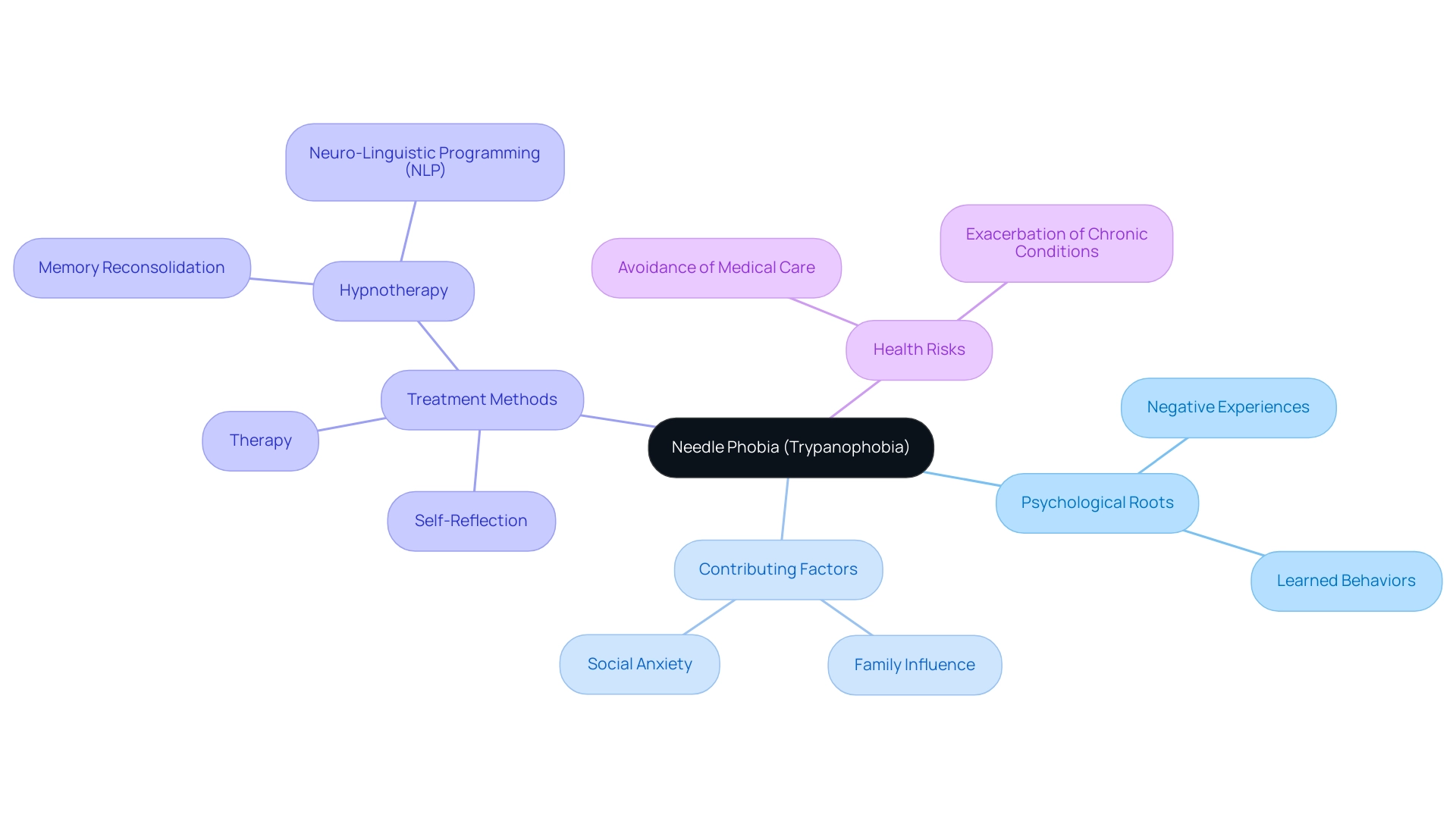
Practical Steps to Overcome Needle Phobia: A Step-by-Step Approach
Overcoming injection phobia can feel daunting, but taking a step-by-step approach can help you navigate this journey toward comfort and confidence, especially when combined with the transformative effects of hypnosis and NLP:
-
Educate Yourself: Begin by familiarizing yourself with the medical procedures that involve injections. Understanding their purpose and benefits can help demystify the experience, reducing the fear that often accompanies it. Research shows that understanding the context of medical procedures can alleviate anxiety.
-
Gradual Exposure: Begin with gentle exposure by looking at images of syringes. Dedicate a few minutes each day to this practice, gradually increasing your comfort level. As you progress, move on to watching videos of needle procedures, allowing yourself to adapt to the sights and sounds in a controlled manner. According to a study by Telch et al. (2017), gradual exposure can lead to significant reductions in phobic responses over time.
-
Practice Relaxation Techniques: Incorporate deep breathing, mindfulness, or progressive muscle relaxation into your daily routine. Such techniques are invaluable for calming your mind and body in the face of fear, improving your overall emotional resilience. Research indicates that relaxation techniques can effectively reduce anxiety levels in individuals with phobias.
-
Visualize Success: Visualization can be a powerful tool. Picture yourself calmly receiving an injection or undergoing a procedure, focusing on the environment, sounds, and sensations. Emphasize positive outcomes in your mental imagery to foster a sense of tranquility. This technique has been supported by various therapeutic practices.
-
Seek Professional Support: Engaging with a psychologist or board certified hypnotist who specializes in fears can provide tailored strategies and essential assistance. Their expertise, combined with hypnosis and NLP, which work synergistically to enhance the effectiveness of treatment, will help you navigate your fears more effectively. As noted by Christabel EW Thing, challenges remain with the inherent heterogeneity of specific phobia as a disorder, making professional guidance crucial.
-
Gradual Real-Life Exposure: When you feel prepared, think about visiting a medical facility to observe procedures involving injections. This experience can acclimate you to the environment without the pressure of undergoing a procedure yourself, slowly building your confidence.
-
Take Action: As you gain confidence, schedule an appointment for a necessary injection. Having a supportive friend or family member with you can help reduce your stress. Be transparent with your healthcare provider regarding your concerns; they can provide extra support and empathy throughout the process.
By adhering to these steps and integrating the knowledge from hypnosis and NLP, which collectively offer a more thorough method for tackling unease, you can slowly face and handle your aversion to injections, nurturing a sense of empowerment and emotional stability. Each small victory along the way is a testament to your strength and resilience.
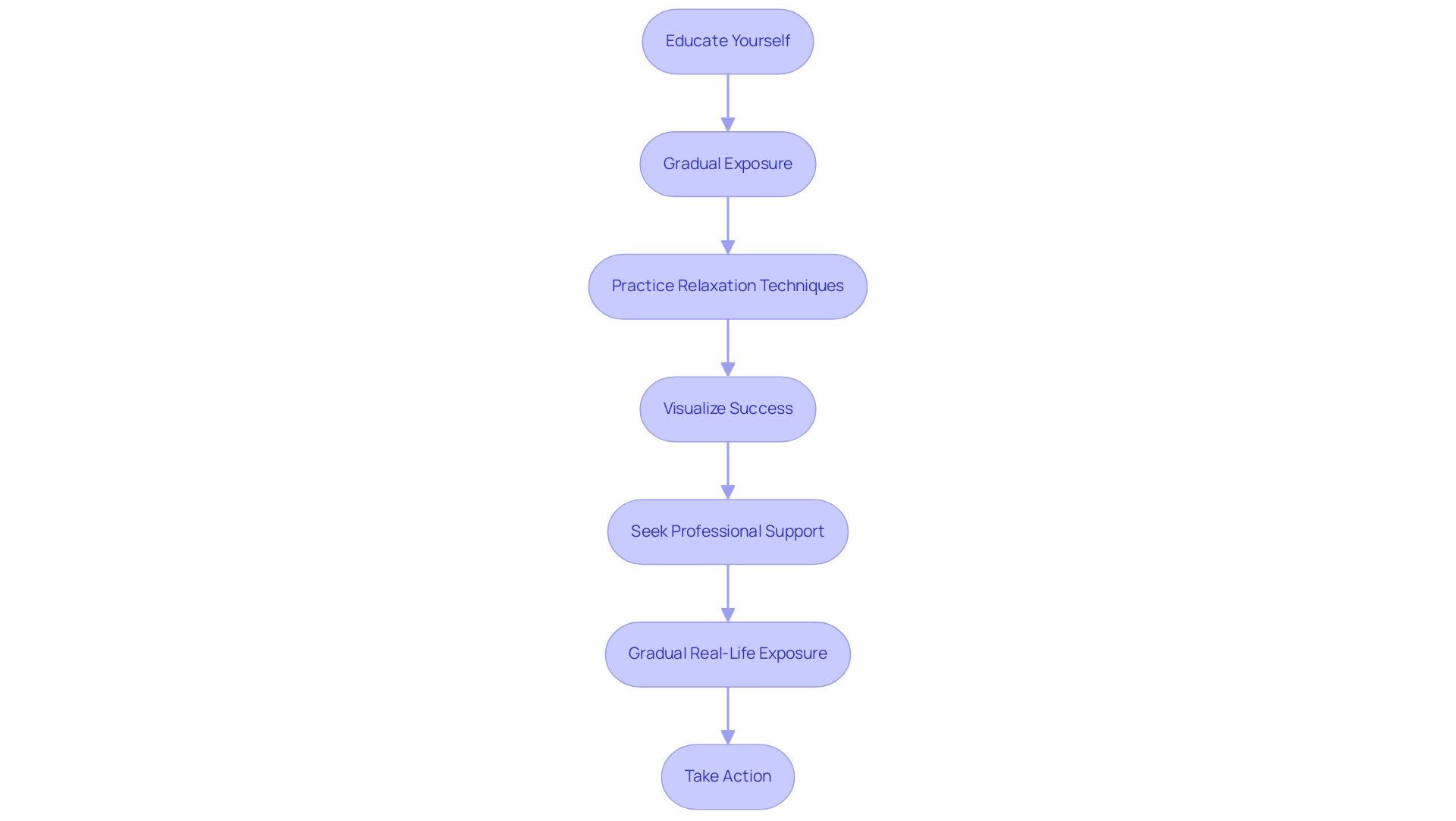
Incorporating Mindfulness and Relaxation Techniques
Incorporating mindfulness and relaxation techniques can profoundly assist in managing needle phobia. Here are some effective methods to consider:
-
Deep Breathing Exercises: Engage in deep breathing by inhaling slowly through your nose, holding it for a few seconds, and then exhaling gently through your mouth. This method not only assists in alleviating stress but also promotes a feeling of calmness, making it simpler to confront your challenges. Many clients at Goodwin Hypnosis have found similar breathing techniques helpful in reducing their stress during sessions.
-
Mindfulness Meditation: Dedicate a few minutes each day to practice mindfulness meditation. Focus on your breath, allowing thoughts to drift in and out without judgment. This practice can ground you, promoting calmness during moments of fear and uncertainty. A systematic review has shown that mindfulness techniques can significantly enhance emotional well-being. A 2015 meta-analysis of 12 studies found that meditation not only diminished stress but also helped to lower blood pressure, particularly among older participants and those with pre-existing high blood pressure, thus highlighting its dual benefits for both mental and physical health.
-
Progressive Muscle Relaxation: Start by tensing and then relaxing each muscle group in your body, beginning from your toes and moving all the way up to your head. This technique can help alleviate the physical tension that often accompanies anxiety, allowing you to feel more at ease. Clients at Goodwin Hypnosis often report a significant reduction in physical tension through similar approaches, reinforcing the effectiveness of this method.
-
Guided Imagery: Use guided imagery to visualize a serene scene or a positive experience involving injections, such as a successful vaccination. This mental rehearsal helps create a sense of safety and control over your fears. In testimonials from Goodwin Hypnosis clients, guided imagery has been recognized for its efficacy in converting worry into a feeling of empowerment.
By incorporating these techniques into your daily routine, you can foster a greater sense of tranquility and resilience when confronting your fear of injections. Remember, you are not alone in this journey. Many have shared their transformative experiences with hypnosis, where they experienced lasting peace and relief from anxiety. As traditional therapies often focus on symptoms rather than root causes, small, consistent steps with these techniques can lead to significant progress.
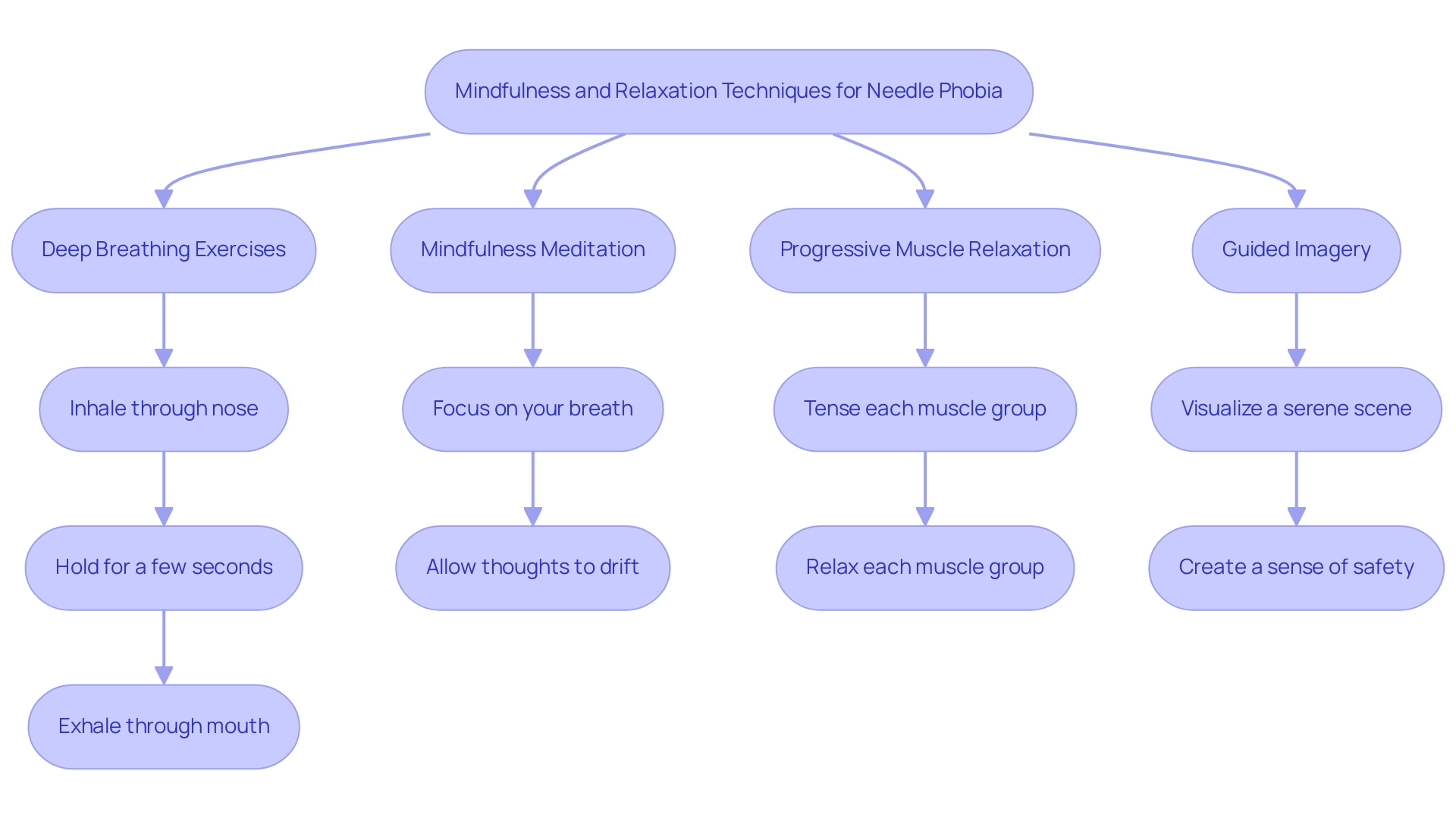
Building a Support System
Establishing a supportive network can significantly assist in overcoming needle anxiety, especially when paired with the transformative effects of hypnotherapy. Here are several compassionate strategies to help you establish and leverage your support system:
-
Confide in Friends and Family: Open up about your concerns to trusted individuals in your life. Their empathy and encouragement can be a comforting presence, offering reassurance as you face your fear. Many clients, like Gabriela Stanard, found that sharing their struggles allowed them to gain confidence and support as they worked through their anxiety.
-
Explore Support Groups: Consider joining a support group designed for individuals dealing with similar fears or anxieties. Research indicates that support groups can enhance recovery outcomes by 30% for individuals with anxiety disorders. Sharing your experiences and learning from others can foster a strong sense of community, alleviating feelings of loneliness. As noted by Oscar N., having a supportive circle is crucial for the healing journey.
-
Collaborate with a Therapist: Working alongside a therapist who specializes in phobias can provide you with personalized coping strategies. They can create a safe space for you to delve into your fears and guide you on the path to overcoming them. Clients like Ray Sunlight emphasize the importance of skilled practitioners who can offer unique tools for emotional recovery, such as guided visualization and cognitive restructuring techniques.
-
Practice Exposure Together: Involve your supportive friends or family members in gradual exposure exercises. Their presence can make the process feel less overwhelming and more achievable. A case study from the Highland Springs Clinic demonstrated that patients who engaged in exposure therapy with a support system reported a 40% reduction in anxiety levels compared to those who did not have such support. Many have observed that this joint method, combined with hypnotherapy, results in notable personal change. By fostering a supportive network, you can enhance your resilience and motivation as you begin the process to conquer your fear of injections. As Dr. Julia Hood from the Adult Autism Center of Lifetime Learning emphasizes, having a supportive system is crucial;
Our role at Highland Springs Clinic is to form a part of that support system, while also walking you through the process of reclaiming or building the life you’ve always dreamed of.
Remember, reaching out and sharing your fears is a powerful step toward healing, as it can significantly reduce the emotional burden and make the journey toward recovery more manageable.
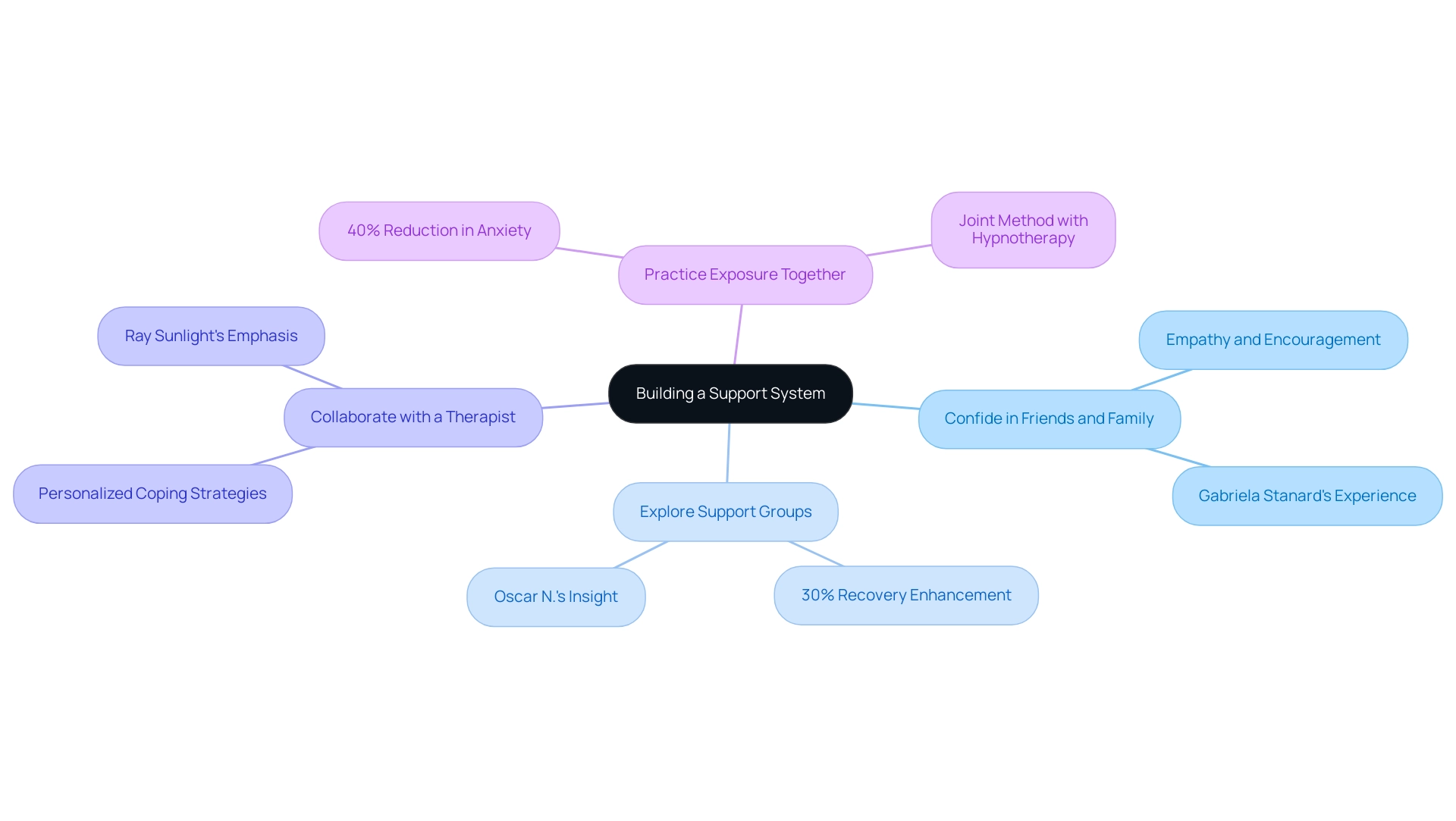
Celebrating Progress and Setting Goals
As you begin the journey to conquer your fear of injections, it’s vital to recognize and celebrate your progress while establishing attainable goals. Research indicates that effective goal setting can significantly enhance motivation in phobia treatment, with participants rating the credibility of goal-setting feedback at a mean of 3.81. Here are some supportive strategies to help you stay motivated:
-
Set Specific Goals: Establish clear, measurable objectives that relate to your exposure to injections. For instance, you might aim to look at an image of a sharp object for five minutes each day or plan a visit to a clinic to observe a procedure within the next month. These tangible goals can help you track your progress effectively. As JH notes, "employers need to be sensitized for the high possibility of failing a high and specific goal when using goal-setting as a motivational and leadership tool," highlighting the importance of setting realistic expectations.
-
Keep a Journal: Documenting your experiences, feelings, and milestones in a journal can be incredibly therapeutic. By reflecting on your journey, you’ll gain insight into how far you’ve come, which can strengthen your commitment to overcoming your fear. This practice has been shown to positively impact mental health and can serve as a powerful reminder of your resilience. As many clients at Goodwin Hypnosis have reported, the process of documenting their feelings has often acted as a springboard for deeper healing.
-
Celebrate Small Wins: Recognize and celebrate every step you take, no matter how minor it may seem. Whether it’s successfully watching a video about a medical procedure or sharing your fears with a supportive friend, each accomplishment matters. Celebrating these small victories can significantly boost your motivation and confidence. The case study titled "Strategies to Counteract Goal-Failure Effects" discusses methods to mitigate the negative effects of goal-failure, emphasizing the importance of acknowledging progress.
-
Reward Yourself: After achieving a goal, treat yourself to something enjoyable—be it engaging in a favorite activity or indulging in a small gift. This positive reinforcement not only helps sustain motivation but also fosters a sense of joy in the process of conquering your fear. At Goodwin Hypnosis, many find that rewarding themselves after sessions leads to a greater sense of accomplishment and a more profound commitment to their recovery journey.
By focusing on your progress and setting attainable goals, you create a nurturing feedback loop that fosters continued growth and resilience in your journey to overcome needle phobia. Remember, every step forward is a testament to your strength and determination. Moreover, considering the transformative effects of hypnosis and NLP, seeking professional help can be a pivotal step toward breaking unhealthy habits and addressing the underlying causes of your fears. The client testimonials at Goodwin Hypnosis highlight how these holistic approaches have facilitated profound personal transformations, such as:
- Gabriela Stanard: "I reached out to Goodwin Hypnosis after reading rave reviews online and not having any luck with my anxiety using the 'typical' therapy options. After 5 sessions of hypnotherapy in 4 weeks with Todd, I can say that I have made more improvements with my anxiety in that short time than I had over the past 6 months."
- Marilyn Jiggins: "I have experienced a phobia of bridges and balconies for several years. After only one session, I am completely free of my fears. Thank you so very much for giving me back my freedom!"
Are you ready to take the first step toward your recovery? Click here.
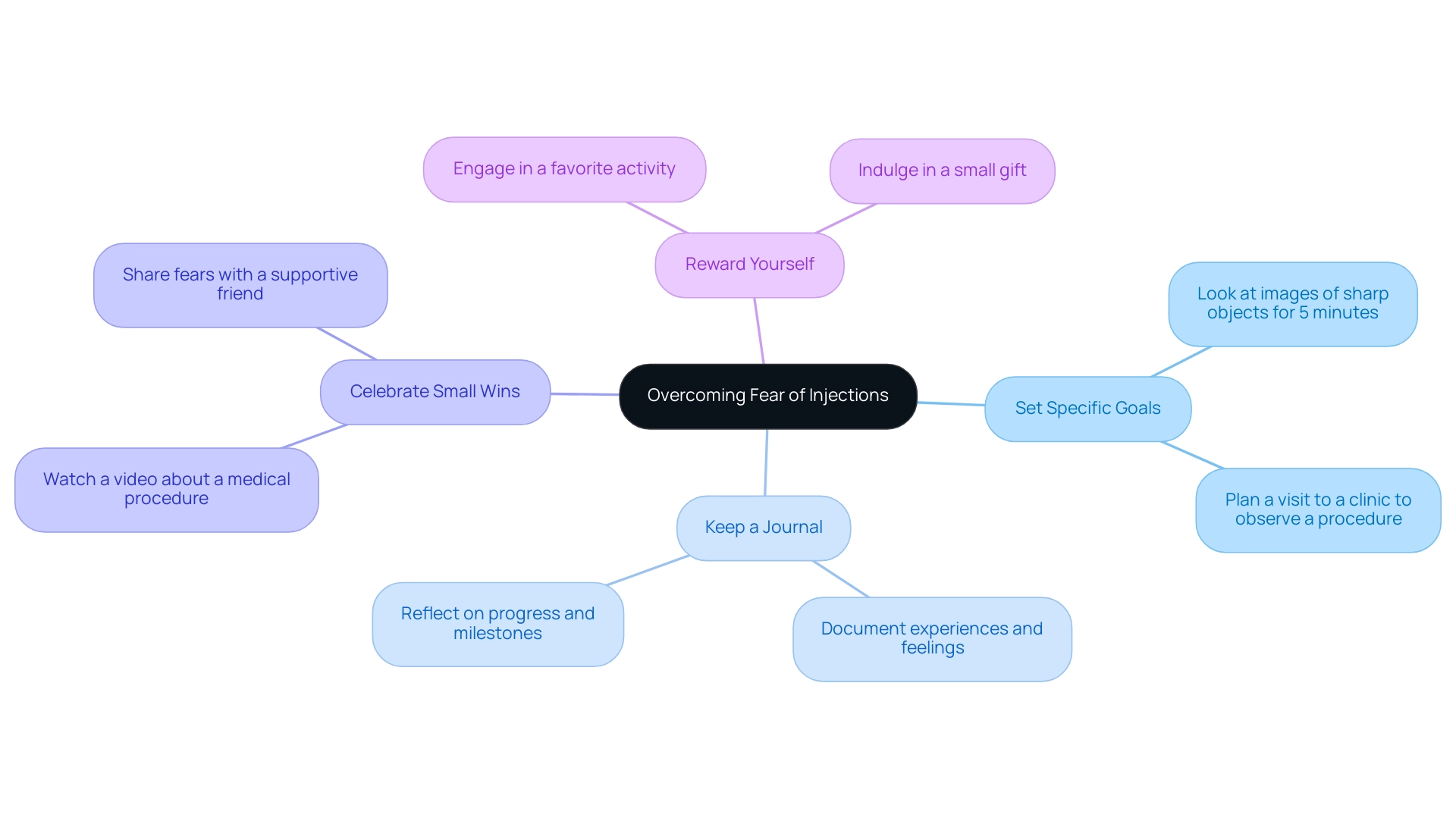
Conclusion
Understanding and overcoming needle phobia is a journey that involves recognizing its psychological roots, implementing practical strategies, and building a supportive network. By exploring the connections between past experiences and learned behaviors, individuals can begin to view their fears through a lens of compassion rather than shame. This shift in perspective is vital for fostering healing and empowerment.
Taking actionable steps—such as educating oneself, practicing gradual exposure, and incorporating relaxation techniques—can significantly alleviate anxiety surrounding needles. Engaging with professionals who specialize in phobias, particularly through modalities like hypnosis and Neuro-Linguistic Programming, can further enhance the process of reclaiming peace and confidence. Additionally, celebrating progress, no matter how small, and setting achievable goals reinforces motivation and commitment to this transformative journey.
The path to overcoming needle phobia is not walked alone. Building a network of supportive friends, family, and professionals can provide the encouragement needed to face fears head-on. Remember, every step taken towards confronting this fear is a testament to personal strength and resilience.
Embracing this journey can lead to a healthier, more empowered future, where individuals are no longer held back by their fears but are free to pursue the medical care they need with confidence.




